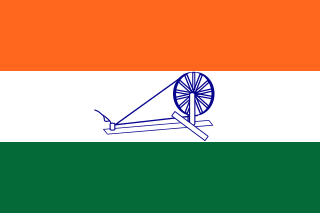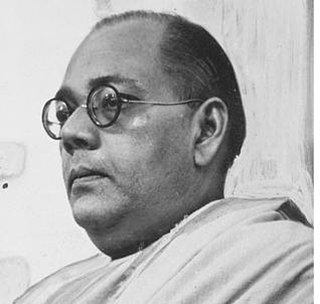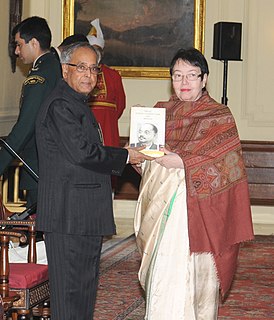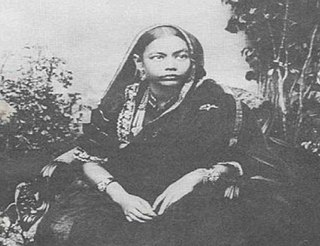
The Indian National Army was an armed force formed by Indian collaborators and Imperial Japan on 1 September 1942 in Southeast Asia during World War II. Its aim was to secure Indian independence from British rule. It fought alongside Japanese soldiers in the latter's campaign in the Southeast Asian theatre of WWII. The army was first formed in 1942 under Rash Behari Bose by Indian PoWs of the British Indian Army captured by Japan in the Malayan campaign and at Singapore. This first INA, which had been handed over to Rash Behari Bose, collapsed and was disbanded in December that year after differences between the INA leadership and the Japanese military over its role in Japan's war in Asia. Rash Behari Bose handed over INA to Subhas Chandra Bose. It was revived under the leadership of Subhas Chandra Bose after his arrival in Southeast Asia in 1943. The army was declared to be the army of Bose's Arzi Hukumat-e-Azad Hind. Netaji Subhas Chandra Bose named the brigades/regiments of INA after Gandhi, Nehru, Maulana Azad, and himself. There was also an all-women regiment named after Rani of Jhanshi, Lakshmibai. Under Bose's leadership, the INA drew ex-prisoners and thousands of civilian volunteers from the Indian expatriate population in Malaya and Burma. This second INA fought under the Imperial Japanese Army against the British and Commonwealth forces in the campaigns in Burma: at Imphal and Kohima, and later against the Allied retaking of Burma.

Subhas Chandra Bose was an Indian nationalist whose defiance of British authority in India made him a hero among Indians, but his wartime alliances with Nazi Germany and Imperial Japan left a legacy vexed by authoritarianism, anti-Semitism, and military failure. The honorific Netaji was first applied to Bose in Germany in early 1942—by the Indian soldiers of the Indische Legion and by the German and Indian officials in the Special Bureau for India in Berlin. It is now used throughout India.

The Provisional Government of Free India or, more simply, Azad Hind, was an Indian provisional government established in Japanese occupied Singapore during World War II. It was created in October 1943 and supported by – as well as largely dependent on – the Empire of Japan.

Emilie Schenkl was an Austrian stenographer, secretary and trunk exchange operator. She was the wife or the companion of Subhas Chandra Bose, an Indian nationalist leader.

Sugata Bose is an Indian historian and politician who has taught and worked in the United States since the mid-1980s. His fields of study are South Asian and Indian Ocean history. Bose taught at Tufts University until 2001, when he accepted the Gardiner Chair of Oceanic History and Affairs at Harvard University. Bose is also the director of the Netaji Research Bureau in Kolkata, India, a research center and archives devoted to the life and work of Bose's great uncle, the Indian nationalist, Subhas Chandra Bose. Bose is the author most recently of His Majesty's Opponent: Subhas Chandra Bose and India's Struggle against Empire (2011) and A Hundred Horizons: The Indian Ocean in the Age of Global Empire (2006).

Sarat Chandra Bose was an Indian barrister and independence activist.

Indian nationalist leader Subhas Chandra Bose died on 18 August 1945 from third-degree burns sustained after the bomber in which he was being transported as a guest of Lieutenant General Tsunamasa Shidei of the Imperial Japanese Kwantung Army crashed upon take off from the airport in Taihoku, Japanese-occupied Formosa, now Taipei, Taiwan. The chief pilot, copilot, and General Shidei were instantly killed.

Shah Nawaz Khan was an Indian politician who served as an officer in the Indian National Army (INA) during World War II. He was profoundly influenced by Subhas Chandra Bose's speeches asking POWs to join the Indian National Army and to fight for a free India, Khan led the army into North-Eastern India, seizing Kohima and Imphal which were held briefly by the INA under the authority of the Japanese. In December 1944, Shah Nawaz Khan was appointed Commander of the 1st Division at Mandalay. After the war, he was tried, convicted for treason, and sentenced to death in a public court-martial carried out by the British Indian Army. The sentence was commuted by the Commander-in-chief of the Indian Army following unrest and protests in India. After the trial, Khan declared that he would henceforth follow the path of non-violence espoused by Mahatama Gandhi and he joined the Congress party. Having successfully contested the first Lok Sabha in 1952 from Meerut, Khan had an illustrious parliamentary career. He was elected four times to the Lok Sabha from Meerut constituency in 1951, 1957, 1962 and 1971. He lost in the 1967 and 1977 Lok Sabha election from Meerut.

Anita Bose Pfaff is an Austrian-born economist, who has previously been a professor at the University of Augsburg as well as a politician in the Social Democratic Party of Germany. She is the daughter of Indian nationalist Subhas Chandra Bose (1897–1945) and his wife, or companion, Emilie Schenkl.

Anuj Dhar is an Indian author and former journalist. He has published several books around the locus of death of Subhas Chandra Bose that propounds theories about his' living for several years after the purported plane crash, thus contradicting the current consensus. Dhar is also the founder-trustee of a not for profit organisation, Mission Netaji, which campaigns for the declassification of documents concerning Bose.

Major General Mohammed Zaman Kiani was an officer of the British Indian Army who later joined the Indian National Army (INA), led by Subhas Chandra Bose, and commanded its 1st Division. He earned the Sword of Honour from the Indian Military Academy, and joined 14/1 Punjab Regiment.

Netaji Bhawan or Netaji Bhavan is a heritage building in Kolkata, West Bengal, maintained as a memorial and research center to the life of the Indian nationalist "Netaji" Subhas Chandra Bose. It is currently the headquarters of Netaji Research Bureau.

Arathil Candeth Narayanan Nambiar was an Indian Nationalist and a friend and colleague of Subhas Chandra Bose. Originally from Kerala, Nambiar spent much of his life serving the Indian independence movement in Europe.

Bhagat Ram Talwar (1908—1983) played an active role in India's freedom struggle. Also known by the alias Silver, he was a freedom fighter and a peasant leader from the North-West Frontier Province in present-day Pakistan. While some authors believe his ancestors were of Punjabi descent, it is known that he was a Hindu Khatri, and identified as a Hindu Pathan.
Leonard Abraham Gordon is a historian of South Asia, especially of Bengal, whose 1990 book Brothers Against the Raj: A Biography of Indian Nationalist Leaders Sarat and Subhas Chandra Bose is considered the definitive biography of Subhas Chandra Bose.
The Indian Struggle, 1920–1942 is a two-part book by the Indian nationalist leader Netaji Subhash Chandra Bose that covers the 1920–1942 history of the Indian independence movement to end British imperial rule over India. Banned in India by the British colonial government, The Indian Struggle was published in the country only in 1948 after India became independent. The book analyses a period of the Indian independence struggle from the Non-Cooperation and Khilafat Movements of the early 1920s to the Quit India and Azad Hind movements of the early 1940s.

Prabhabati Bose was an Indian social activist and politician. She was born in 1869 into a respected Kayastha Bharadwaja clan Dutta family of Hatkhola, in Calcutta North. Her parents were Ganganarayan Dutta and Kamala Kamini Dutta of Kashinath Dutta Road, Baranagore, India. She was her parents' eldest daughter.
Basanti Devi was an Indian independence activist during the British rule in India. She was the wife of activist Chittaranjan Das. After Das' arrest in 1921 and death in 1925, she took an active part in various political and social movements and continued with social work post-independence. She was awarded the Padma Vibhushan in 1973.

Gumnaami is a 2019 Indian Bengali-language Factual film based on the true events directed by Srijit Mukherji, which deals with the mystery of Netaji's death, based on the Mukherjee Commission hearings and the book Conundrum written by Anuj Dhar and Chandrachur Ghose. It has been produced by Shrikant Mohta, Pranay Ranjan, and Mahendra Soni under the banner of Shree Venkatesh Films. Prosenjit Chatterjee plays the roles of Subhas Chandra Bose and Gumnaami Baba.
Gandhi Memorial Asram popularly known as Sodepur Khadi Ashram is a heritage institution of Sodepur, Panihati, North 24 Parganas in the Indian state of West Bengal.
















